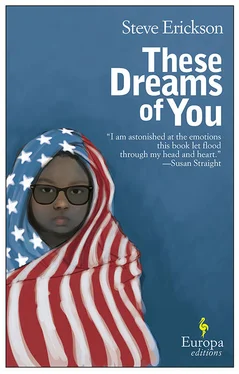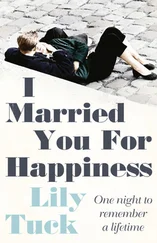Reg says, “Look here, is this about Jaz being a colored bird?”
“Giving a speech to some students,” says Bob, “but, uh, I’m not sure what to tell them — I don’t think there’s much I can tell them,” in his high nasal voice, “and the government doesn’t want me coming. I mean their government but mine too, I suppose. Will I only succeed in giving the white government a, a. . an excuse to arrest black Africans? Am I only making trouble? Do I become the. . rationale by which more blacks are oppressed, beaten, brutalized? Is this about my damned ego? Is this one more test I put myself to, for which other people pay the price, as my brothers paid the price for my father? I keep going over the speech. Taking the anger out. Putting it back in.”
“What is it these students want from you, then?”
For the first time tonight the hair-trigger altar boy becomes all of a piece with his sad burning eyes. “I don’t believe one man changes everything,” he says, “maybe no one man changes anything , least of all me. I’m an accident . But I believe there are times when even men who aren’t great must find a way to try and do great things. People think I’m afraid of nothing when the truth is I’m afraid of everything, and not so long ago I vowed before a God I love and trust a little less than I used to that I would do all the things I’m afraid of, because I do believe anyone can change part of something, and that part of something changes something else, and soon the ripple in the lake is the wave on the beach.”
At Olympic Studios off Baker Street the next day, the session starts late. The band spends most of the morning and early afternoon waiting outside in a van for another session to finish; Reg and Jasmine don’t speak. He tries to tell her about the conversation under the Wimpy overhang in the downpour, but she doesn’t want to hear about it.
Once in the recording studio, there’s further delay over the tuning of the guitars, and discussion about replacing a whistle in the song’s middle-eight with a flute. Because there’s no time left, the session is necessarily brief, two takes, the second in the can. “You changed one of the lines,” Jasmine complains to Reg and he explains, “Made it a bit our own, yeah?” and she says, “Yeah, well, the bloke who wrote it has this funny idea the song is his.” She’s bitching about everything today, thinks Reg.
Near the end of the session, she ducks out of the studio and stops on the way home at the pub below the Ad Lib, where Jonesy buys her a drink and she’s stunned by the BBC interview on the telly above the bar. “Bloody hell,” she mutters into her glass, staring at the screen.
“Hey,” says Jonesy, remembering the night before, “isn’t that. .?” How can I be so dim? she thinks. And I’m studying to be a bloody journalist. “Doesn’t really look like that in real life, does he?” Jonesy says. “A lot older in real life.” A week later over a cup of tea, she reads in The Times an article about him in South Africa.
The article describes him arriving at midnight at the airport outside Johannesburg to no state reception whatsoever, the government having decided to ignore him. Because no one representing the government is there, the airfield is stormed by hundreds of black South Africans to greet him. A few days later at the Cape Town university where he’s scheduled to speak, the government cuts the speaker cables; he speaks anyway—“It’s from numberless diverse acts of courage and belief,” he murmurs, barely audible, “that history is shaped”—stumbling through his address in his high nasal whisper, to silence that precedes the thunderclap of ovation. He rides in the backseat of an open car, recalling for those few reporters able to cover the story, the vast majority having been denied credentials and travel papers, an image that leaves them unnerved. In defiant response to that image, he stands in the backseat rising from the sea of black faces that grows from day to day and town to town.
He faces down protesters who claim to base their views on Judeo-Christian beliefs by asking how they can be certain God isn’t black. He walks through black villages and the immense crowd doubles, triples, multiplies in what seems unquantifiable exponents; he shakes every black hand that never before has been offered a white hand that didn’t have in it a stick.
Each rally becomes so large as to leak into the next until it’s as if the entire country is a rally. For everyone who sees him, the astonishing courage of the small shaking man with the limp handshake who said to Reg, “People think I’m afraid of nothing when the truth is I’m afraid of everything,” has about it the force of revelation. “We felt small and meaningless,” the article quotes one of the student leaders, a young woman Jasmine’s age, “and he’s the only man to come tell us we’re not alone. He has reset the moral compass.”
Over the next year, pursuing her studies in London and continuing to work for the record company, she keeps the Times article as it makes its folded way from one textbook to the next.
She doesn’t forget the night she met him. She follows his career and speeches back in his own country, alert to any mention in the press of a return to London. In the fall of 1967 she applies for a visa and quits both her job and school, and flies to New York, remaining forty-eight hours before she catches a train to Washington, D.C.
As a low-level secretary and receptionist, she has worked on his staff for three months before he notices her. By then the Washington office has sent her back to the New York office, and over the course of those three months he brushes past her desk twice, even nodding at her routinely without recognizing her. Then the third time something he can’t place breaks his stride as he passes, before he keeps going. The fourth time, he stops and stares at her.
Almost puppyish he cocks his head, studying her. To her irritation, having been in his company a couple of hours in London and felt no intimidation, now she’s a bit terrified of him. “You’re new?” he says.
“About three months,” she says. “I was put on staff in September.”
Then he remembers: It’s her accent, she realizes. “London,” smiling the small smile as he walks away, “you were angry at me.” A week later Jasmine sits at her desk daydreaming about Christmas trees and spending her first holiday abroad when the woman who hired her calls her into a cubicle. “Just how settled are you here?” says the woman.
“What do you mean ‘here’?”
“New York.”
Jasmine shrugs. “Fancy getting a proper little Christmas tree.”
“Get a proper little Christmas tree in Washington. They want you back down there, maybe for a while.”
By ten o’clock that night she’s back in Washington. For a few days she’s doing the same work that she was in New York. On the weekend she takes the train back to pack the rest of her things and hasn’t been in her flat twenty minutes before the phone rings. “What are you doing here in New York?” says the woman who hired her, on the other end of the line.
“Sorry?”
“Didn’t I tell you to get down to D.C.?”
Jasmine says, “Right, well, I came back to get the rest of my thi—”
“They’re looking for you down there.”
“I’ve been there all week.”
“The senator was looking for you this morning,” huffs the woman, slightly irate. “Get back there this afternoon.”
Читать дальше











